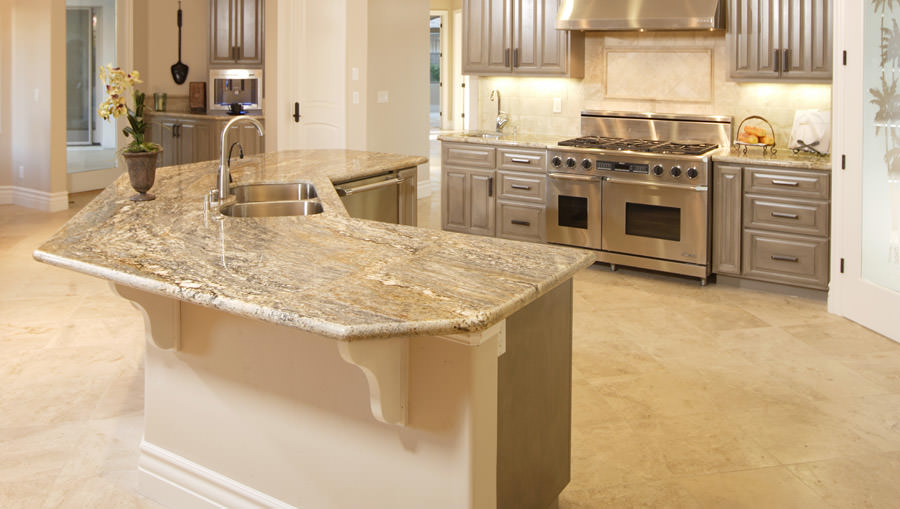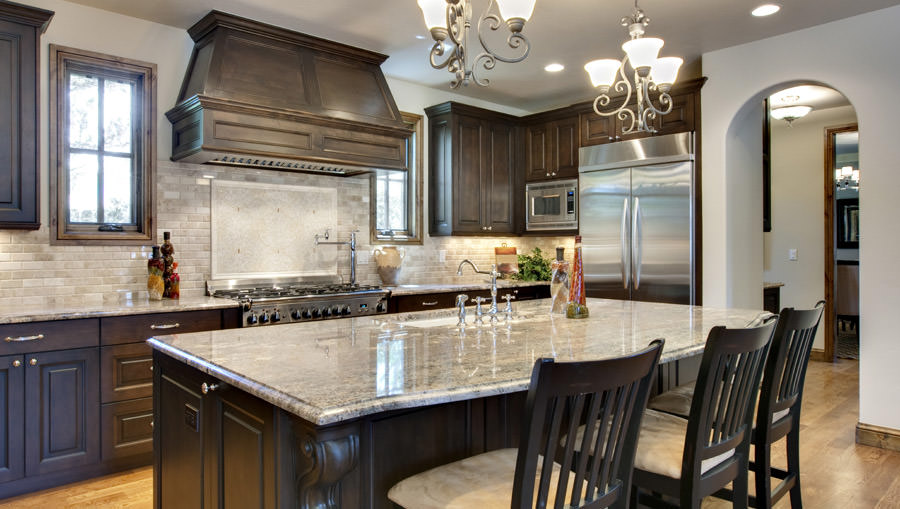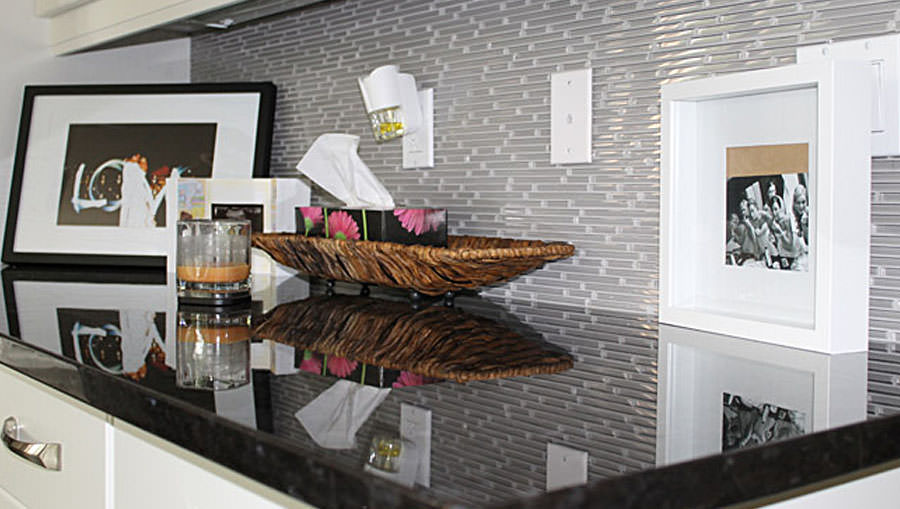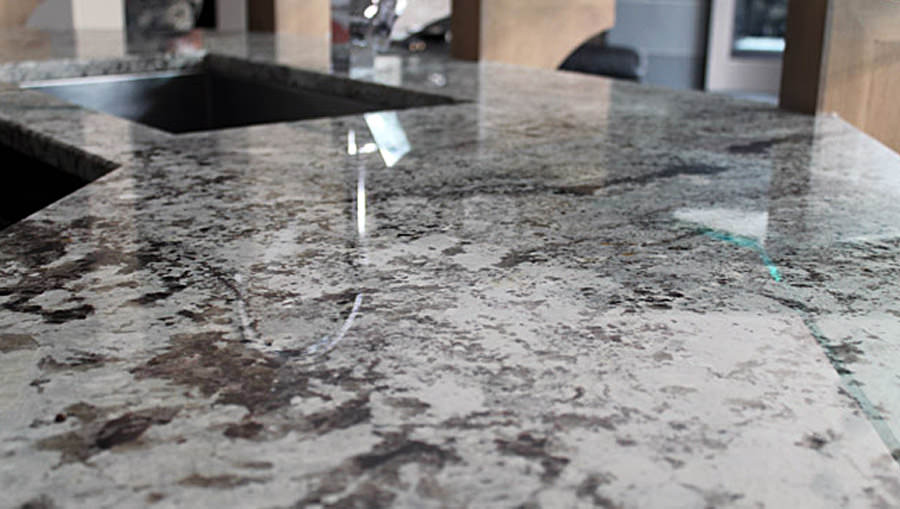Is your granite “pre-fab”? Will you be creating a lot of mess in my house or driveway?
Urban Stone Surfaces is a custom fabricator of granite, quartz and marble countertops. We generally work with full sized slabs (approx. 5-6ft high by 9-10ft long) and 3cm (about 1-1/4”) thick. This means every countertop is custom-tailored specifically to your kitchen design, minimizing the amount of seams and maximizing the beauty!
We do nearly all of the “messy” fabrication work at our manufacturing site, with the exception of small finishing work on-site to make your counters just right. You are guaranteed professional results from the initial design through fabrication and final installation. Urban Stone Surfaces guarantees the quality of all our work.
Why do you specialize in using 3cm slabs? What is the advantage of 3cm vs. 2cm?
Using 3cm slabs of granite and quartz allows us to produce an attractive edge profile without the process of laminating (gluing an extra piece on the edges) which creates a seam, and adds significantly to the labor costs. 3cm slab can also cantilever (overhang) farther than 2cm without requiring plywood or other support. However, we are also perfectly adept at fabricating from 2cm slabs, if by chance the exact color you want is not available in 3cm.
Will my countertop have visible seams?
Most kitchen countertop installations will require at least one or more joints called seams. Slab size may no be large enough for the entire run of the countertop or the weight of the material may dictate that seams are inserted so that the structural integrity of the material is not jeopardized. The cabinet structure, placement of cook tops, or other cutouts may require seams.
During layout and design, Urban Stone Surfaces will always try to minimize the number of seams required, and to locate seams in places which make them less conspicuous. Finally, Urban Stone Surfaces installers are trained to color-match the joint filler material to enhance their appearance. Seams are created with a permanent, maintenance-free epoxy material, NOT like tile grout in any way!
Are there special cleaning requirements for granite and quartz countertops?
Maintenance of granite and quartz surfaces is easy. For daily cleaning, a non-abrasive dishwashing liquid is recommended. Although granite is very solid and nearly non-porous, spills left on the surfaces for an extended time period may leave some residual staining – even if sealed properly. Most stains usually dissipate over time on their own. If immediate removal is desired, a stain-lifting poultice powder can be used. Quartz surfaces such as Caesarstone and Zodiaq are billed as “maintenance-free” and do not require sealing – otherwise they feature the same ease of daily cleaning as granite. Marble, because of its mineral makeup, requires a bit more care and maintenance, although in a bathroom which is where we typically install marble surfaces, there are few issues.
How often do I need to re-apply stone sealer to granite?
It’s hard to predict how our customers will use their countertops, so Urban Stone Surfaces does not advise any preset calendar for re-sealing, but in general, once every year or two is sufficient.
Natural stone is porous and can absorb spills and stains if left untreated. To protect its natural beauty sealing your stone with a quality sealer will prevent spills and stains from damaging your counter. Your countertop is already sealed prior to installation and is sealed once again after installation is completed. Urban Stone Surfaces will recommend the proper sealant product for future use.
Over-application of sealer can build up over time and cause a haze on the surface of your countertops. The frequency for re-sealing really depends on the type of granite installed (lighter colors are more porous than darker ones) and the amount of use that the countertops see. An easy rule of thumb is to closely monitor the area around the sink. If you begin to notice that water does not bead up or soaks into the stone within 10-15 minutes, then it’s probably time to re-seal.
Applying sealer is easy; you simply spray it on, let it soak in for a few minutes, and wipe it away with a clean towel. Quartz surfaces do not require any sealing.Etch marks (dull spots) can appear if you do not wipe up liquid spills that are acidic. Spills, such as fruit juices, wine, coffee, tea, water, vinegar, ketchup, bbq sauce, and soft drinks, can lead to damage and will etch (eat away) the surface of your stone. Your sealer does protect the surface but spills left for sometime will create a chemical reaction and leave a dull spot. Some alkaline cleaners will result in etch spots so avoid these cleaners. If you end up with and etch spot or area we can professionally refinish and restore your natural stone’s even finish.
Marble is more sensitive to liquids as compared to Granite – but both still do require care and precautions.
What happens if there are Spills and Stains?
Spills will occur. Many types of liquids and sauces can leave their mark including the above mentioned and also vegetable and olive oils, grease splatters, etc. It’s important to wipe up spills as they happen or a stain will be left. Always test a small surface area first before any cleaner is applied.
• Liquid Spills / Food Spills – Blot liquid spills with a paper towel or clean white cloth. It is important to blot only; wiping a spill may spread it over a larger area, making a larger mess. Food spills – scoop up food with a spoon then blot with dry cloth. Any cloth you use should be white as sometimes cloths are not 100% colour fast. Last thing you would want is a colour leaking cloth. With a new clean white cloth – use only water and a stone soap or mild liquid soap to wipe surface.
• Oily Spills/Stains – if you know the substance has an oil base (salad dressings, cooking oils, pastes, etc) you maybe able to remove it with our 3-1 Cleaner. Or consult a professional cleaner or natural stone restoration specialist.
Can I cut on my granite or quartz countertop?
Only if you want to ruin your good knives. Granite and quartz is harder than steel, and will dull knives very quickly if you use the countertop as a cutting surface. Always cut and chop on a wooden or plastic cutting board.
Can I place hot pots and pans on my granite or quartz countertop?
Granite is nearly impervious to typical kitchen cooking temperatures, though you may wish to avoid any risk of damage by using hot-pads or trivets. Quartz surfaces such as Caesarstone and Zodiaq are tolerant of heat up to about 300ºF, so you’ll want to use more care around them with very hot cooking surfaces.
My sample of granite has pits on the surface – will I have these on my kitchen counters?
Granite, which is crystalline in structure, always has tiny pits – spaces between the various mineral crystals. You don’t see them on a larger piece because the overall appearance is polished and mirror-like. Granite sometimes has natural fissures as well, which may look like cracks, but are not structural defects and are a naturally occurring result of the immense heat and pressure which formed the granite eons ago. These characteristics are part of the natural beauty of stone and will not impair the function or durability of the material. A product of nature cannot be expected to look manmade. Fortunately the process of “resining” can greatly reduce the appearance of pits and fissures, as well as help repel stains.
What is “resining” stone?
Resining natural stone is a procedure meant to fill fissures and pits in the stone. The slabs are first honed to allow the surface of the stone to evenly absorb the resin. The stone is then dried and resin is spread over the entire surface of the stone, and then cured in special ovens. After the resin has cured, the slabs are polished. All excess resin is removed from the face of the slab, leaving only the resin that has filled any fissures or pits – the resin does not “coat” the surface.
Will my granite look like the online sample?
The samples you see on the computer have been scanned and saved as digital images. The color tones may not be absolutely correct due to variations in computer systems and monitors. Granite also has naturally occurring variations in color, tone, granularity, pattern, etc. These variations are expected and are the source of its natural beauty.
Although sample stones are intended to be representative of the quarry’s product, the material quarried at one time may differ slightly in color and veining from the sample. Moreover, even a single granite slab will possess a certain amount of color variation from one end to the other. Interior designers and architects have come to view this tendency of natural stone as an advantage. Slight irregularities can be pleasing, introducing an element of the natural into human-designed spaces, whether residential or commercial.
Will I be able to hand-pick my slabs?
You will always hand-pick the exact granite or marble slabs used for your counter tops, either from our local inventory, or at one of our slab suppliers. Quartz surfaces such as Caesarstone and Zodiaq are ordered directly from the samples because they are very consistent in color and texture.
Do I need to remove my existing countertops first?
Yes, your kitchen needs to be ready for us to install your new countertops on the day we come to do the install. Demolition is another job entirely and can take several days, so plan ahead.
Can you re-connect my electrical and plumbing connections?
Urban Stone Surfaces team is a highly trained contractor for countertops, but we are not electricians or plumbers. We cannot assume any liability for making electrical, gas, or plumbing connections.




